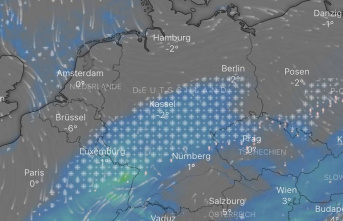Now it's getting dark earlier again: Summer time came to an end on Sunday night, the clocks were put back from 3:00 a.m. to 2:00 a.m. Normal time, also known as winter time, applies again until the end of March.
"Everything worked out tonight," said Dirk Piester from the Physikalisch-Technische Bundesanstalt (PTB) on Sunday. The system is also thoroughly checked every six months, always in advance of the time change. The dissemination and representation of the time is one of the statutory tasks of the authority in Braunschweig.
In the extreme west of Germany, the sun will set at around 5.10 p.m. at the beginning of winter, in the east on the border with Poland even a good half hour earlier. It is unusual that the meteorologists expect late summer temperatures for the first day of winter, namely maximum values of 21 to 27 degrees with longer sunshine. According to the German Weather Service (DWD), the noticeable accumulation of mild October months in recent decades is "clearly the result of global warming".
Abolition of the time change is off the hook
The time change was reintroduced in Germany in 1980. In the wake of the oil crisis of 1973, there were hopes of being able to save significant amounts of energy in this way. According to experts, however, this hope was not fulfilled.
Especially after the changeover in spring, when an hour is "stolen", many people complain of exhaustion and sleep problems. However, there is no end in sight to the half-year change between summer and winter time. Although the EU Commission has made a proposal as to how the changeover could be abolished, the states of the European Union cannot agree. The project has been on hold in Brussels for a long time.
The sleep doctor Dieter Kunz advocates leaving the change between summer and winter time in Germany as it is now. "Humans also have a seasonal variation in physiology, clocked by light and dark. They function differently in winter than in summer and need more sleep," said the chief physician of the clinic for sleep
Germany in particular is pushing for abolition
The urge to abolish the time change is also less strong in most neighboring countries than in Germany, said Piester from the PTB. "A further coordinated approach would be very desirable in order to avoid a patchwork of different time zones in Central Europe," he emphasized.
The PTB scientists ensure that radio-controlled clocks, time displays and industrial clocks are supplied with the signal via a long-wave transmitter. The transmitter called DCF77 is located in Mainflingen, Hesse. "We estimate the number of radio-controlled watches with DCF77 reception at around 100 million," said Piester. Along with satellite navigation systems and the Internet, DCF77 is one of the most used sources for reliable and precise time information. Without the transmitter, many time displays at train stations, airports and in radio and television stations would not work with the required reliability.
DST weather forecast information












